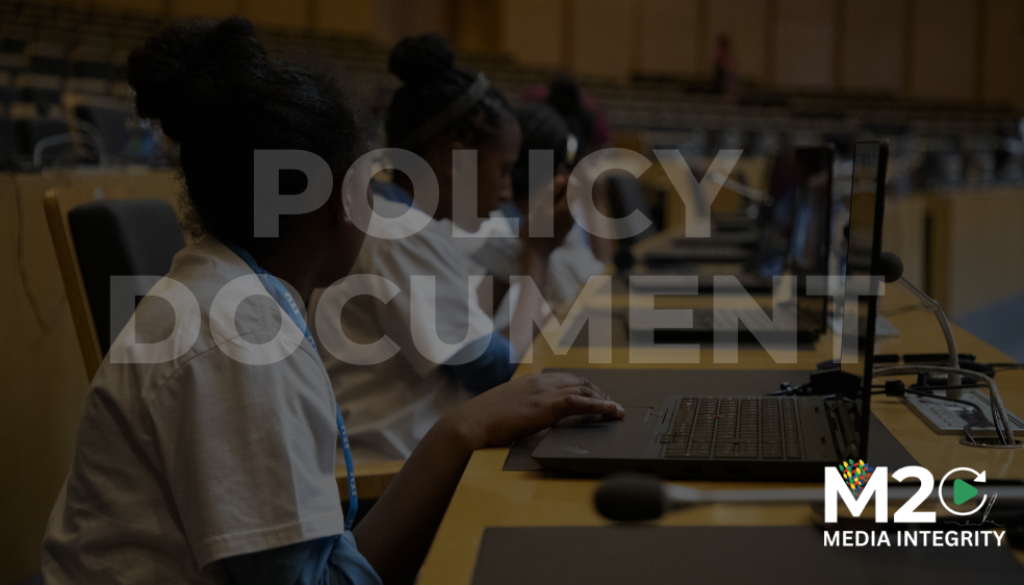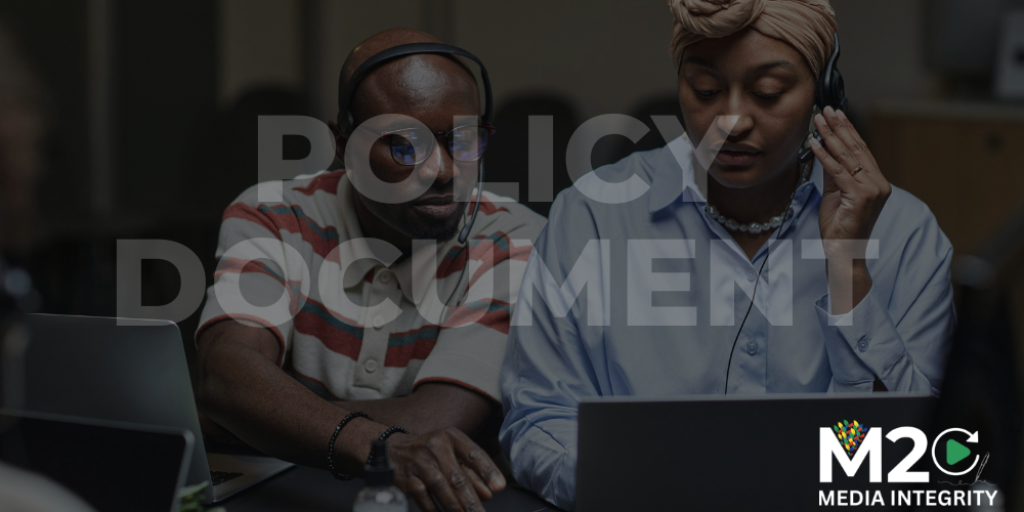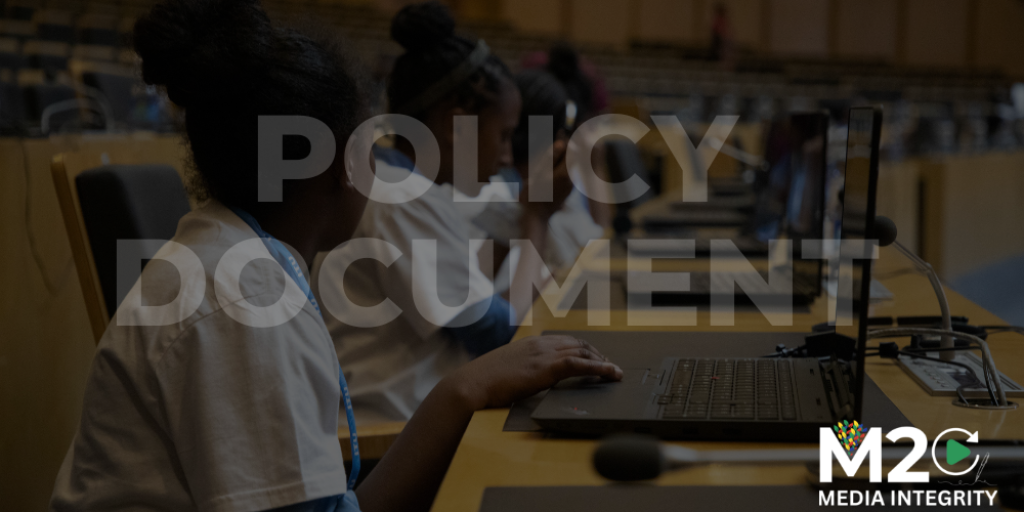M20 Policy Brief 4: Power, Politics, and Economics – AI, Africa and the G20
Download the PDF here.
By Scott Timcke and Zara Schroeder
Overview
As the G20 advances its AI for Africa initiative, media organisations across the continent face a twin challenge. This is providing journalistic coverage of developments in AI governance with appropriate scrutiny while simultaneously navigating AI’s direct impact on journalism itself. This brief argues that these two factors mean the media’s role as watchdog becomes more vital – not less – in an era of concentrated digital power, and that the G20’s AI policies require robust media oversight to prevent the entrenchment of technological dependencies that marginalise African interests. The G20’s current AI discussions inadequately address the media’s oversight function, despite media being explicitly referenced in Africa’s AI Continental Strategy. This gap represents an oversight in democratic governance frameworks for AI, particularly given that African countries occupy one of the most vulnerable positions in the global AI technology stack.
Defining the issue and why it is important in a G20 Context
The convergence of AI governance, media as a factor for public accountability, and African development presents three interconnected challenges that directly align with South Africa’s G20 presidency theme of Solidarity, Equality, and Sustainability. This represents an opportunity to ensure that AI systems serve all humanity equally, that African voices have a fair weighting in global decision-making about advanced technology, and that development pathways move beyond extractive relationships toward broad beneficiation models that strengthen African agency and self-determination.
These issues present three interconnected challenges that demand G20 attention. These are:
- Power Concentration and Democratic Oversight: AI development is concentrated among a handful of global technology companies, creating unprecedented concentrations of economic and informational power. Traditional regulatory mechanisms struggle to monitor these actors effectively, let alone govern them for the public interest, particularly when AI systems operate across jurisdictions and technical complexity creates barriers to transparency and accountability.
- Africa’s Structural Position in the AI Economy: African countries primarily contribute to AI development through low-paid jobs in data labeling and reinforcement learning. For example, African workers earning US$1-3 per hour to label images enable billion-dollar AI applications like autonomous vehicles. These are a foundational component of producing AI systems, but also the least profitable layers of the AI stack. The reverse side of the coin is the lack of African data for African AI development, and the related exclusions of African languages and knowledge within the dominant systems that are imported into the continent. This positioning reinforces economic dependencies while failing to address sovereign control over AI systems that increasingly shape agriculture, health and education sectors that are identified as priorities in the Continental Artificial Intelligence Strategy that was endorsed by the African Union in July last year. Meanwhile, AI systems are also shaping finance and debt, the environment, information and even governance itself.
- Media Capacity and Coverage Gaps: Journalism covering AI governance suffers from knowledge gaps, with many reporters treating AI developments as ‘technology stories’ rather than ‘power and policy stories.’ This approach often fails to dig into the governance implications of AI adoption by both governments and corporations, and the implications for labour. The G20’s approach to AI for development can reproduce these power imbalances, especially if it fails to strengthen independent media capacity to monitor AI governance and AI corporate behaviours.
The Broader Context
The deployment of AI technologies across Africa, often via social media platforms and business-to-consumer (B2C) software, occurs within a broader context where multinational technology corporations extract value from African data while contributing little to the productive base or economic development. This uneven dynamic is exemplified by the concentration of AI infrastructure ownership among a handful of Global North corporations, creating what scholars term ‘digital colonialism’.
Notwithstanding over 400 million active social media users and 600 million internet users out of a total population of 1.5 billion, Africa’s digital transformation is uneven. In conjunction with sources in everyday life, the continent’s online spaces experience acute information integrity challenges that make it harder to advance and consolidate democracy.
Since 2022, foreign-sponsored disinformation campaigns have targeted at least 39 African countries, with one country alone responsible for 80 documented campaigns across 22 African countries. These campaigns exploit structural vulnerabilities in Africa’s information ecosystems, including limited media literacy and declining press freedom. There is a lack of suitable legal frameworks for freedom of expression and access to information, online and offline, and instead, there is an overly technocratic approach to AI governance. Both stand in the way of higher information standards.
Repression of independent journalism across much of Africa undermines the media’s capacity to pay attention to give critical oversight of AI governance. Independent regulatory authorities for digital platforms remain weak or non-existent. The surge in information manipulation coincides with deteriorating press freedom, creating a feedback loop where authoritarian tendencies are reinforced by non-existent or weakened democratic oversight mechanisms. Governments increasingly distort “fake news” laws to suppress dissent, while internet shutdowns during critical periods – ostensibly to combat disinformation – systematically undermine freedom of expression and access to information.
While malicious actors leverage AI for large-scale information manipulation, AI-driven fact-checking tools can offer some countervailing possibilities. There are some major caveats, however. First, fact-checking depends on resource-intensive human verification that cannot match the pace of dissemination of misinformation. Second, there is often little profitability in fact-checking services, meaning that these exercises depend on short-term donor grant cycles and the goodwill of (typically underpaid) participants. Third, corrections often fail to reach affected audiences due to platform failures to promote this content. Fourth, the absence of African languages in major AI models reflects deeper structural inequalities that make it harder to deploy automated tools for content moderation. This creates a multilayered challenge requiring interventions across technology, resources, business models, linguistic equity, and platform governance.
The G20’s focus on AI governance presents an opportunity to address these challenges, yet current policy recommendations inadequately address the media’s democratic oversight function. Fixing this omission is necessary, given AI’s concentration of power among a small number of technology corporations whose decisions affect billions of users across Africa and the Global South more broadly.
Key Issues for the media and AI in Africa
Government AI Policy Accountability: How can media organisations in Africa (and elsewhere) effectively monitor government AI adoption, data governance practices and algorithmic decision-making in public services and state security agencies? Current transparency mechanisms are inadequate for complex AI systems, and government procurement and deployment of these technologies.
Corporate AI Oversight: What investigative methods and partnerships between media enterprises can enable media to investigate AI companies’ data practices, algorithmic bias, and market behaviour? The technical complexity of AI systems often shields corporate practices from public scrutiny, while the global nature of AI companies complicates jurisdictional oversight.
Language Representation: Why do AI systems consistently underrepresent African languages? This gap, which reflects broader power imbalances in AI development, has practical implications for AI system effectiveness and intensifies the intrinsic problem of generative AI producing fabrications. Can African media find partners to develop large language models based on media archives, enabling local AI applications and demanding payments from foreign AI companies interested in such data?
Media Industry AI Integration: How should news organisations navigate their own AI adoption while maintaining editorial integrity and independence and avoiding dependency on potentially unsustainable and biased AI services? The rush to integrate AI tools could create vulnerabilities for media organisations.
Capacity Building for Deeper AI Coverage: What support do African media organisations need to develop their coverage of AI governance that goes beyond product reporting to examine issues related to power, policy and social implications like race and gender biases?
Proposals for G20 Consideration
Establish AI Governance Transparency Standards: The G20 should encourage governments to mandate that AI systems used in public services meet specific transparency and auditability requirements; this can help set comparative benchmarks that journalists can use for oversight of how states are using these technologies. This mandate should include algorithmic impact assessments for government AI deployments and standardized reporting on AI decision-making processes.
Support Independent AI Oversight Mechanisms: G20 countries and donors can help create funding streams for independent media organisations, including in Africa, to develop AI governance expertise and investigative capacity. This includes support for specialised training, technical resources and collaborative networks for AI accountability reporting. Governments alone will not have the capacity, or in some cases the political will, to monitor how this billion-dollar international industry is impacting their country.
Promote African AI Tools: G20 initiatives should prioritise support for local language model development, and data governance frameworks that prevent extractive relationships.
Strengthen Media Freedom: The G20 should endorse concrete benchmarks for press freedom and information integrity, including sanctions for governments that twist ‘fake news’ legislation against journalists. Support for independent media outlets and digital rights organisations should be integrated into all AI governance initiatives.
Proposed Text for Inclusion in G20 Outputs
“Recognising that artificial intelligence systems increasingly shape economic, social, and political outcomes, we affirm the role of independent media in monitoring AI governance and corporate practices. We commit to strengthening transparency mechanisms for AI that enable meaningful media oversight of these systems in both public and private sectors.”
“We acknowledge that sustainable AI development in Africa requires robust accountability mechanisms that prevent the entrenchment of technological dependencies. We support initiatives that enhance African media organisations’ capacity to provide critical coverage of AI governance and corporate behavior.”
“We recognise that AI development must respect linguistic and cultural diversity, and commit to supporting AI systems that serve African languages and contexts rather than marginalising them.”
Recommendations for G20 Media Coverage
Reframe AI as a Story about Power, not Just Technology: African media coverage should focus on who controls AI systems, how decisions are made, and what impacts result, rather than emphasising technical capabilities or breakthrough narratives. This applies not only to generative AI and what safeguards and biases are involved, but also to the role of social media platforms in using AI systems on the one hand to recommend disinformation, misinformation and hate speech as well as to partially moderate such content on the other.
Investigate Data Flows and Economic Relationships: Follow the money and data in AI systems, particularly examining how African data contributes to AI development and the extent to which economic benefits flow back to African communities.
Monitor Government AI Adoption: Develop systematic approaches to covering government use of AI in service delivery, security agencies and general decision-making, with particular attention to transparency, accountability, and citizen impact.
Examine Corporate AI Claims Critically: Challenge corporate narratives about AI benefits and capabilities with independent verification, particularly examining ‘magical’ claims about AI’s impact on development goals.
Build Collaborative Networks: Develop partnerships with other media organisations and civil society groups, within Africa and across G20 and other countries, in order to share resources and expertise for AI governance coverage, recognising that effective oversight requires sustained, specialised reporting.
Acknowledgements and call for comments
This policy brief was drafted by Dr. Scott Timcke, Senior Research Associate, Research ICT Africa, [email protected] and Zara Schroeder, Researcher, Research ICT Africa, [email protected].
This policy brief was commissioned within the framework of the M20 ahead of the G20 Summit.
The M20 initiative is a “shadow” parallel process set up to intersect with the G20 processes. The M20 seeks to persuade the G20 network of the most powerful global economies to recognise the news media’s relevance to their concerns.
As a collaborative M20 document, this paper is a working, live document. Share your suggestions or comments for consideration: [email protected].
For more information about the G20 process, which is hosted by South Africa in 2025, visit the website here
Additional source documents and further reading
- African Union Commission. (2024). Continental Strategy on Artificial Intelligence for Africa.
- Ahiabenu, K. (2025). Guidelines on data access for key stakeholders in African elections. Research ICT Africa.
- Berger, G. and Orembo, E. (2025). Data deficits and democratic processes: The under-explored role of data in African elections. Research ICT Africa.
- Center for News, Technology and Innovation. (2025). A Window into AI and Journalism in Africa: Perspectives from Journalists and the South African Public. Center for News, Technology & Innovation.
- (2023). Reporting on artificial intelligence: a handbook for journalism educators.
- Timcke, S. (2025). Focus on the democratic fundamentals: What comes before the promise of AI in African elections. Research ICT Africa.
This policy brief can be republished under Creative Commons licence, – i.e. provided that you credit the source, indicate any changes to the text, and link back to the original article on the M20 site.
- Share your suggestions or comments for consideration: [email protected].



